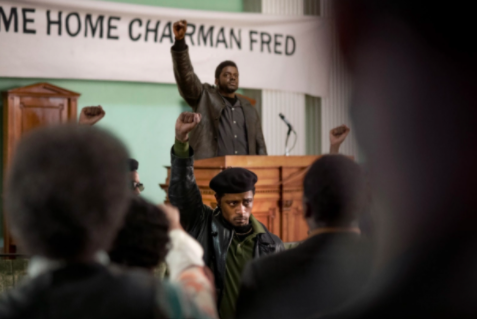The story of the Black Panther Party is often-untold part of African American History. Though the Civil Rights Movement often steals the spotlight, the Black Panther Party was just as influential, spanning 68 cities across three continents with thousands of members at its peak.
Focused on the empowerment of Black communities, the Party created multiple community service programs that included feeding and educating children along with free clinics.
Aside from Huey P. Newton, founder of The Black Panther Party, Fred Hampton was the most recognized individual of the movement. As chairman of the party’s Illinois chapter, he formed an intercultural movement called the Rainbow Coalition to fight for social change and end oppression for the impoverished. However, despite his assassination only a year after Dr. Martin Luther King Jr.’s, most people don’t even know his name.
“Judas and the Black Messiah” attempts to fix this historical ommission, but throughout the film the main character ends up not being Hampton. Instead, the story focuses on FBI infiltrator William O’Neal and his involvement rather than Hampton’s rise to prominence.
The film opens on O’Neal (Lakeith Stanfield), a simple car thief. O’Neal targets a Black establishment and ironically parades himself as an FBI agent in order to steal a car. However, his attempt fails, and he quickly finds himself in an FBI interrogation room where an agent presents him with his first dilemma out of many throughout the movie: time in prison or infiltrating the Party to take down Hampton (Daniel Kaluuya). O’Neal chooses the latter, and he begins to travel down a rabbit hole of greed and guilt that fatally affects many other characters.
In one of the best scenes in the film, Hampton manages to steal the show when he gives a thrilling, fiery speech in front of hundreds of supporters after his release from prison. Meanwhile, the camera captures a tension-building back and forth with O’Neal and his FBI handler Roy Mitchell, who is standing disguised in the crowd, adding another layer of suspense.
It would also be unforgivable to not mention Dominique Fishback’s amazing performance as Hampton’s girlfriend Deborah Johnson. Beginning as a shy and quiet supporter, she uses her love of poetry to strengthen Hampton’s words and provides a deeper inspection of the struggle of being a strong Black woman. In one of the movie’s most pleasing scenes, she attempts to explain this struggle to Hampton through a poem.
However, it disappointed me to see the film leave out much of Hampton’s story. They didn’t bother with explaining his origins or his rise to power in The Black Panther Party. Instead, they begin in the moment of his life where William O’Neal entered the picture. In an otherwise great film, they missed a golden opportunity to fully tell Hampton’s story to many viewers who were unaware of who he was.
When leaving this film, your lasting thoughts will not be of Hampton’s story. They will be of FBI’s illegal brutality and O’Neal’s betrayal of the Black community.
Both are reminders you’ll prefer to forget.
cjrtxd@mail.umkc.edu








